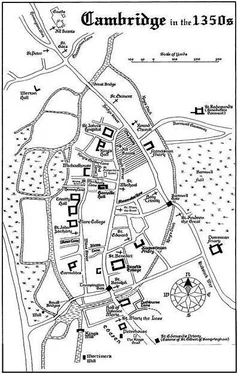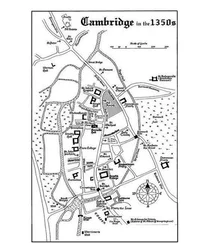‘Then go back to Michaelhouse,’ said Bartholomew wearily. ‘And do not “help” without my permission again.’
‘I do not want him tampering with my personal places, thank you very much,’ said Isnard after Quenhyth had gone. ‘He can take his green camomile and lard and shove them up his own arse.’
‘I am sorry, Isnard,’ said Bartholomew. ‘And I cannot help with your itch, either. I do not know what can be done to alleviate it.’
Isnard sat back with a grimace and folded his arms. ‘Do not worry about that, Doctor. I am already cured. The notion of that boy loose on my bowels has quite put the itch out of my mind.’
‘And there were doucettes and a rose pudding to follow,’ enthused Michael gleefully the following Saturday, as he walked with Bartholomew and Michaelhouse’s Master of Civil Law, John Wynewyk, to the Church of St Mary the Great. ‘Along with more Lombard slices than I have ever seen in one place, although I prefer the almond variety to the date.’
‘We will be late,’ warned Wynewyk, more interested in the debate they were about to engage in than his colleague’s detailed analysis of the repasts he had enjoyed at various academic and religious institutions during the week. ‘I do not want Gonville to win the Disputatio de quodlibet by default, just because we fail to arrive on time.’
‘All right,’ muttered Michael, not pleased to have his culinary reminiscences cut short. ‘I am going as fast as I can. I thought you would be interested in what is eaten at the high tables of other Colleges, since you hold Michaelhouse’s purse strings these days. Gonville keeps a remarkably fine table, and Michaelhouse … well, Michaelhouse does not.’
‘Langelee trusts me to spend our funds sensibly,’ said Wynewyk primly. ‘That means peas for pottage and flour for bread, not cream and sugars for custards.’
Although the monk complained constantly that Michaelhouse’s fare was inferior to that of other institutions, and his colleagues had learned to take his grumbles with a grain of salt, Bartholomew thought his gripes were currently justified. For some unaccountable reason the standard of College food had plummeted dramatically during the last two weeks, and even the least discerning scholars had been prompted to comment on it. Bartholomew supposed that Wynewyk had been obliged to use the funds usually earmarked for victuals for some other – doubtless equally deserving – purpose, and just hoped the situation would not be permanent. It was not pleasant to be hungry all the time.
He was about to ask, when there was a clatter of hoofs behind them. With the memory of Isnard’s shattered leg fresh in his mind, Bartholomew darted to one side of the road, with his friends not far behind; even the obese Michael could move quickly when life and limb were under threat. A horse galloped past, too fast for a narrow thoroughfare like St Michael’s Lane. It reached the end of the street and its rider wheeled it around, to return at a more sedate trot.
‘Rob Thorpe,’ said Michael heavily when he recognised the culprit. Wynewyk immediately raised his hood and bowed his head, and Bartholomew saw that Thorpe’s reputation had gone before him. Even men like Wynewyk, who had not been in Cambridge when the lad had embarked on his spree of violence, were unwilling to attract his attention. ‘So, it is true. You have indeed decided to return to the town you used so badly.’
Thorpe had changed during the two years that he had been in exile. He was no longer a bony, gangly youth with immature fluff framing a childish face. He was a man, with a man’s strength and a man’s confidence, even though he was not yet twenty. He was clean shaven, and wore a close-cut quilted tunic with buttoned sleeves – called a gipon – over which was thrown a shoulder-cape fastened with a gold pin. His hose were soled, rendering shoes unnecessary, and his hood turban was one of the most elaborately decorated Bartholomew had ever seen. It comprised a triangle of scarlet worsted with a hole for the head, and the two ends fell elegantly over his shoulders in the fashion currently popular at the King’s Court.
‘I have been meaning to pay you a visit, monk,’ said Thorpe insolently. The smile that played around his full, red lips did not reach his eyes. His gaze shifted to Bartholomew, and he bowed his head in a gesture that was more insulting than polite. ‘And you, too, Bartholomew, although I did not think you would still be here.’
‘Where else would I be?’ asked Bartholomew, a little surprised by the statement.
‘I thought you would have been burned at the stake for using unorthodox and dangerous remedies,’ Thorpe replied nastily. ‘But perhaps people are more forgiving these days. Times change, I suppose.’ The bitterness in his voice was unmistakable.
‘What do you want?’ demanded Michael curtly. ‘You must know you are not welcome in Cambridge. You were found guilty of several vicious murders, and you are fortunate you were not hanged. You are not the kind of man we want in our town.’
‘I have come to visit old friends,’ replied Thorpe, unruffled by the monk’s hostility. His eyes were spiteful as he addressed the physician. ‘I intend to pay my respects to your family soon – your sister Edith and her husband Oswald Stanmore. I am sure they will be delighted to see me after all these years.’
‘“All these years”?’ echoed Michael in disbelief. ‘It has only been twenty-six months.’
Bartholomew knew delight would be the last thing on his family’s mind if they were visited by Thorpe. Stanmore was a wealthy clothier, and Thorpe had been one of his apprentices. He and Edith had taken the lad into their house and treated him like a much-loved son. Their sense of betrayal when they discovered they had nurtured a killer was still not forgotten.
‘You will have to wait for that pleasure,’ said Bartholomew, relieved that they were away and did not plan to return to Cambridge for some weeks. With luck Thorpe would be gone by then. ‘They are not here.’
Thorpe shrugged, although Bartholomew sensed he was disappointed. ‘It does not matter. I have been waiting for a long time to reacquaint myself with my old master and his wife, so a few more days are nothing. When did you say they will return?’
‘I did not,’ replied Bartholomew coolly. ‘But Hunting-don is a long way from here, so I doubt it will be very soon.’
‘Huntingdon is not far,’ flashed Thorpe with sudden anger. ‘ France is a long way from here – and that is where I was condemned to go. No one would speak for me at my trial – not my father, not the Stanmores, and not you scholars. I will repay you all for that.’
Michael raised his eyebrows. ‘No one spoke for you, because you were guilty – by your own admission. You cannot blame others because you were caught and punished. You are a man now, so act like one, and accept responsibility for what you did.’
Thorpe became smug. ‘But my case has now been reviewed by His Majesty’s best law-clerks. I have been granted a King’s Pardon – which means no one can hold those crimes against me ever again.’
Michael was unimpressed. ‘I shall hold crimes against whomever I like. However, I do not want to talk to you when I have important matters to attend. Move that miserable nag out of my way and let me past.’
They all looked around as a second horseman arrived, also riding too fast for the small lane. Bartholomew’s heart sank when he recognised him, too, and Wynewyk huddled even deeper into his cloak.
‘Edward Mortimer,’ said Bartholomew, taking in the sober clothing and soft features of the exiled baker’s son – the second of the two felons to be pardoned and permitted to return to the scene of his crimes. Like Thorpe, Mortimer had grown sturdier and stronger during the time he had been away. Bartholomew remembered him as a dreamy lad, bullied by his domineering father, but there was no weakness in his face now. It was cold, hard and determined, and Bartholomew saw the malleable youth had long gone.
Читать дальше












